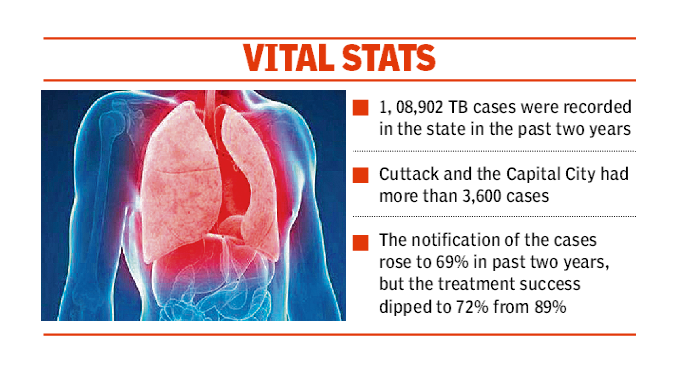Bhubaneswar: A rise in number of tuberculosis cases in the twin city has raised questions about authorities’ methodology in tackling the issue. Health experts who have sounded alarm bells warned if proper steps are not taken, TB incidence will go up further.
According to reports by National Health Profile (NHP), Odisha saw 1, 08,902 cases recorded in the state in the past two years. Among these, Cuttack and the Capital City had more than 3,600 cases making TB only second worst after vector-borne diseases.
What’s alarming is that out of the cases reported, 873 are paediatric patients. As pulmonologist Kartik Jena explains, “There are two types of TB: latent and active. In the former, the bacteria in the body remain in a dormant state but can reactivate later while in the latter bacteria will be in the most active state and can be highly contagious spreading through the air.”
“Children are more prone to TB, also resulting in death following infection. Those with latent TB become a reservoir of the ailment that resurfaces in adulthood. Children under the age of 2 years are more vulnerable to the disease,” he adds.
As the soaring numbers are met with neglect and ignorance of Health Department, a senior official (on the condition of anonymity) states, “Paediatric TB is relatively hard to diagnose and is given a low priority but truth be told we lack properly-trained staff and efficient infrastructure to tackle TB overall.”
The official also mentioned that after studying many cases it was found that proper monitoring of them is not done. “We have created enough awareness about TB but many patients are almost becoming incurable due to improper treatment,” he adds.
The veracity of his words can be judged from the NHP reports which mention that while the notification of the cases rose to 69 per cent in the past two years, the treatment success plummeted to 72 per cent from 89 per cent during the same period.
Suggesting ways to counter the issue, Kartik said that TB is curable through directly observed treatment short-course (DOTS). However, he advised that the city should be overly cautious of the disease as urbanisation and growth are inviting a large number of people from within and outside the state.
“Poverty, poor housing, urban environments and overcrowding all attribute to TB cases. With the state having 1 lakh TB population and more than 200 cases surfacing every year, Odisha can be in a difficult situation if the issue remains unaddressed.”
The official, however, said that they are planning to launch massive awareness programmes and improve the infrastructure. “Most people have a very limited knowledge of the disease, especially in rural areas.
The monitoring and diagnosis of the patients also needs drastic improvement and providing immediate doses of DOTS will also be a priority,” the official added.
US & Drug Cartels
US President Donald Trump has made drug trafficked into his country a major reason for his policy of forcing illegal...
Read moreDetails





































